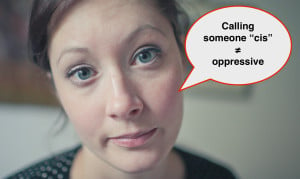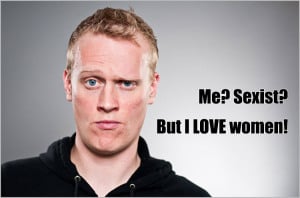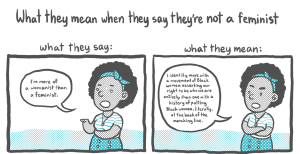
A person sitting outdoors at a restaurant holds up a bright pink tablet to see their reflection as they hold up a tube of lipstick near their face.
“Can I be a feminist and still wear makeup?”
“I’m a feminist, but I still shave my legs.”
“Changing your last name to your husband’s is anti-feminist!”
If you’ve talked about feminism with other feminists, you’ve probably heard statements like these – and maybe even made them yourself.
For many new feminists, analyzing and critiquing individual practices like these is an important first step towards understanding how sexism works in our world.
It’s important to notice how gendered expectations impact and harm all of us, and it’s perfectly normal to wonder how much of what you love to do – whether it’s cooking or wearing feminine clothes or taking care of children – was actually shaped by the sexist messages you’ve been taught since birth.
But focusing on questions like “Can I wear makeup and still be a feminist?” can prevent us from moving our analysis forward and understanding the fact that sexism isn’t just about what individual people choose to do or not to.
It’s also about how institutionalized oppression impacts which choices are available and encouraged for different types of people.
Here are three reasons why “Can I _____ and still be a feminist?” is the wrong question to be asking – and how we can get past it.
1. It Often Fails at Intersectionality
Is it “feminist” for a woman to wear dresses, high heels, and makeup? Some feminists would say no, because she’s “conforming” to traditional standards of femininity or “playing to the male gaze.”
But what if she uses a wheelchair? What if she’s fat? Disabled women, fat women, and many other women and non-binary people who experience additional forms of oppression have traditionally been denied access to femininity. These people are often desexualized and expected to hide their bodies with baggy or utilitarian clothing.
There’s no male gaze for them to “play into” because it’s widely assumed that no man would ever want to gaze at them.
For someone like that, dressing in an unabashedly feminine way can be a way to make themselves and their bodies visible, to demand attention in a world that prefers to avert eyes.
How about getting married to a man and changing your last name to his? Definitely anti-feminist, right? Maybe from the perspective of a white middle-class woman.
For many Black women, getting married can be an empowering response to centuries of having their families ripped apart by slavery, poverty, police brutality, and other racist practices. When you haven’t always had the right to choose your own spouse, making that choice can be extremely meaningful. Black women also face harsher social penalties than white women if they choose not to get married.
Further, most people of all genders already have a man’s last name – their father’s. For some women, taking your partner’s last name is a way to distance yourself from a father who was abusive or absent. You choose your partner (and their name); you didn’t choose your father.
Many of the practices that some feminists debate over and label as “anti-feminist” have much more complicated meanings when viewed through an intersectional lens.
Try not to assume that what’s empowering or disempowering for you is that way for everyone – because we all have different social positions and histories.
2. It Doesn’t Address the Root of the Problem
If every single woman stopped wearing makeup today, would sexism be over?
Is the fact that many women continue to wear makeup the reason why sexism continues to exist?
No and no.
That doesn’t mean that refusing to wear makeup can’t be an empowering and meaningful choice for some individuals – of course it can! It can be a way to push back against gender roles or simply leave more time in your day for things you care more about.
We all have our little acts of rebellion that help us get through the day and sometimes even inspire the people around us to resist oppression, too.
But it does mean that blaming women who wear makeup for the existence of sexism by calling their choice “anti-feminist” takes a rather shallow view of the problem.
Ultimately, sexism isn’t about makeup, high heels, or shaving your legs.
True, the pressure placed on (some) women in some societies to do those things is part of the way sexism manifests. But the basis of sexism is that men are superior to other genders and that we cannot trust the perceptions, choices, or feelings of people who are not men.
That’s why when I see some feminists claiming that women doing things associated with femininity are somehow “brainwashed” or “don’t know what’s good for them,” I feel uncomfortable. You know who else says we can’t be trusted to make our own decisions? Sexist men.
In a society totally free from sexism, you might see a lot fewer women wearing makeup and high heels, shaving their legs, or getting married to men. Or you might not. But the way to get there isn’t to continue policing women’s choices about their own lives and bodies. That’s what we need to stop doing.
There’s nothing inherently problematic about removing some of your body hair or putting pretty colors on your face. What’s problematic is the expectation that (some) women do it in order to appeal to men and to dominant standards of femininity.
A world without flouncy dresses and sexy heels and rad eyeshadow designs would be a pretty sad world to me. But a world where anyone of any gender is free to engage in or avoid these things as they wish? That sounds amazing.
3. It Makes Marginalized People Responsible for Fixing Entire Oppressive Systems
If you can’t be a feminist and wear high heels, what are you supposed to do if that’s the only way you can keep your job? If you can’t be a feminist and get married, what are you supposed to do if that’s the only way you can access some of the same economic privileges that everyone else has, or the only way you can stay in the same country as your partner and children?
I do believe that we all have some responsibility to leave this world a better place than we found it. But I also know that because of our varying levels of privilege and our different social positions, we don’t all have access to the same methods of resistance and advocacy.
If we start labeling certain individual choices as inherently incompatible with being a feminist, we make feminism a much, much smaller movement than it can be – than it should be.
Have you noticed how it’s always women and non-binary people worrying about whether or not this or that individual choice is feminist, or getting shamed for choosing something that isn’t? Why don’t we ask whether or not a man can be a feminist and wear suits and ties, or marry a woman, or have a beard?
I think it’s because the burden for fixing sexism has been placed squarely on the shoulders of the people who are most harmed by it, and therefore have the least power to challenge it.
When I see young feminists worrying that they are single-handedly reinforcing sexism by shaving their legs, I want to tell them that the broader movement to end all oppression will not succeed or fail based on your personal grooming choices.
So by all means, reject femininity if that’s meaningful to you. But that doesn’t mean that everyone who doesn’t is hurting the movement.
Are there choices that are truly anti-feminist, or incompatible with having a feminist identity? Of course. I’d argue that any choice that limits the choices available to other people based on their social category is anti-feminist.
That’s why you can be a feminist and choose to keep an unplanned pregnancy due to your own values, but you can’t be a feminist and campaign for laws that would force other pregnant people to make the same choice.
You can be a feminist and choose not to have casual sex because it feels wrong for you, but you can’t be a feminist and shame your friend for having casual sex.
This way of looking at it places the focus back on the real problem – systems of oppression themselves.
It’s definitely important to acknowledge how oppression limits the choices available to us and places huge penalties on certain choices. But we must trust marginalized people to navigate these realities in the ways that work best for them.
Sometimes that means making the socially expected choice. Sometimes it means resisting.
But you are the only one who gets to say which is right, safe, or acceptable for you in that moment.
[do_widget id=’text-101′]
Miri Mogilevsky is a Contributing Writer for Everyday Feminism and a recently graduated with a Masters in Social Work and is starting a career as a counselor in Columbus, Ohio. She loves reading, writing, and learning about psychology, social justice, and sexuality, and is working on her cat photography skills. Miri writes a blog called Brute Reason, rants on Tumblr, and occasionally even tweets @sondosia.
Search our 3000+ articles!
Read our articles about:
Our online racial justice training
Used by hundreds of universities, non-profits, and businesses.
Click to learn more




















